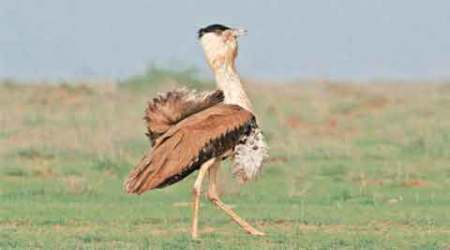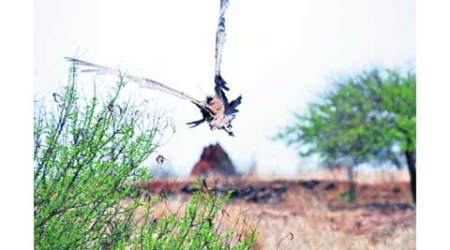 In 2015, Dr Pramod Patil was in news for winning the prestigious Whitley Award, also known as the ‘Green Oscar’, for his work on the conservation of the GIB.
In 2015, Dr Pramod Patil was in news for winning the prestigious Whitley Award, also known as the ‘Green Oscar’, for his work on the conservation of the GIB.
With officials and experts raising doubts on Pune-based ornithologist Dr Pramod Patil’s work on the conservation of the Great Indian Bustard (GIB) and after having received an official complaint about his work, the Bombay Natural History Society (BNHS) has initiated an inquiry into the matter and terminated Patil’s contract with BNHS as the GIB Conservation & Advocacy Officer.
In 2015, Patil was in news for winning the prestigious Whitley Award, also known as the ‘Green Oscar’, for his work on the conservation of the GIB, a critically-endangered species, in the Thar Desert in Jaisalmer. The award, instituted by UK-based Whitley Fund for Nature (WFN), included a memento and a cash prize of Rs 35 lakh. It was presented to him at the Royal Geographical Society in London.
Doubts about his work was brought to the notice of BNHS more than a month back by Rajasthan-based Dharmendra Khandal, a conservation biologist associated with Tiger Watch. Khandal shared that Patil came in contact with him in March 2016 when Khandal was busy carrying out the Village Wildlife Volunteer Program, an anti-poaching initiative in Ranthambore.
“Later, during a chance meeting with him at Desert National Park, when I asked him about his work, his work space, his team in the area, he gave ambiguous answers. That raised doubts in my mind. In the past two years, he has made several claims about his work in various leading newspapers and news portals. Given that I am from this area, I know the local community as well as the forest officials here. When I checked with them about Patil’s work, I learned he hardly visited the area. Then how could he carry out conservation work. The reason I raised the issue is that an endangered species, which is on the verge of extinction, is being cheated here,” said Khandal.
Other than the Whitley Award, Patil has been a recipient of the Sanctuary Asia Wildlife Service Award, Kirloskar Vasundhara Sanman and Vivek Paranjape Memorial Award. The Whitley Award money was meant to be utilised by Patil — to increase capacity of the state forest department to address poaching issues and set up anti-poaching teams involving local stakeholders; establish a participatory monitoring network to engage people with conservation and gather crucial data on GIB’s status, range and threats; and educate communities and raise awareness on government support available for sustainable livelihoods that are in line with conservation efforts.
 The Great Indian Bustard
The Great Indian Bustard
Although in his various interviews, Patil has been claiming to have done all this and more, according to Anoop KR, director of Desert National Park, in the last two years, Patil has spent altogether less than a month at Desert National Park. “No anti-poaching teams have been set up. No capacity building workshop was organised by him. In fact, forest department had organised one workshop, where he was one of the faculties among many others. Though he has claimed to have recruited 50-100 people from Jaisalmer to report bird-sighting, no such recruitment have taken place,” he said.
On Khandal’s complaint, Deepak Apte, director of BNHS, said, “Some valid questions have been raised and we have initiated an inquiry into this. We will check and verify facts. It is only now we got to know he hasn’t done any fieldwork since the past one year. When we checked with him, he admitted it and said he couldn’t go due to his father’s illness. If the issue wouldn’t have been raised, we wouldn’t have come to know. As of now, we have terminated his contract.”
Apte added that BNHS is currently in the process of collecting facts and records and “will come clean on the matter”. Reacting to the allegations, Patil admitted he hasn’t been active in the field for the past one-and-a-half year. The reason, he says, was community resentment. “Before going ahead with any activity I wanted to design a better strategy. On his termination from BNHS, he says, “I haven’t given it a thought. Right now, my father is ill and family is my first priority.”
While BNHS has broken its ties with Patil, its website still shows Patil as GIB Conservation & Advocacy Officer who has “contributed to conservation of GIB and has worked in close association with various state governments”. He has given his inputs to Species Recovery Plan, Bird Life International’s Species Factsheet, and IUCN Red List Chapter of GIB.”






